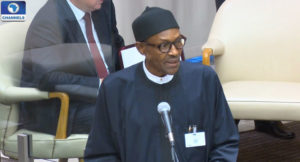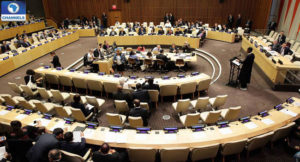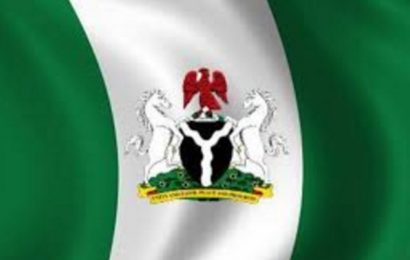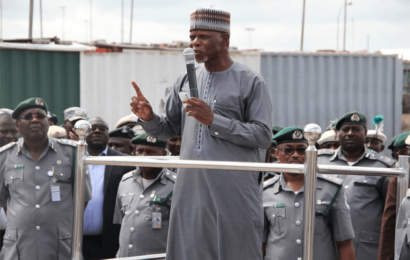 President Muhammadu Buhari has described as disheartening the number of people that have been displaced from their ancestral homes due to the activities of Boko Haram terrorists in Nigeria’s northeast.
President Muhammadu Buhari has described as disheartening the number of people that have been displaced from their ancestral homes due to the activities of Boko Haram terrorists in Nigeria’s northeast.
The Nigerian leader made the statement on Monday at the opening of high level plenary on Addressing Movements of Refugees and Migrants at the UN Headquarters in New York.
He said over 600,000 have turned refugees in neighbouring countries, with two million displaced within the northeast.
President Buhari, however, expressed concern that the refugee problem is coming at a time the world economy is shrinking.
Efforts to Meet Immediate Needs
The President pledged Nigeria’s commitment to working with the international community in addressing the issues of movements of refugees and migrants.
He also promised that his administration would make efforts to meet the immediate needs of the Internally Displaced People.
“Any discuss of refugees and migrants in the case of Nigeria will be incomplete without reference to our Internally Displaced Persons, victims of Boko Haram’s terrible atrocities.
“The Boko Haram insurgency has caused a huge refugee problem of an estimated 600,000 persons for Nigeria’s neighbouring nations.
“We are making concerted efforts to meet our citizens’ immediate humanitarian needs by reducing their risk and vulnerability and increasing their resilience through vocational training and skills acquisition programmes, particularly for IDPs in camps, ” he told world leaders.
He listed some other interventions of the government to include; the Presidential Intervention Committee on Rehabilitation of the North-East; the Victims Support Fund; the Safe Schools Initiative and the proposed North-East Development Commission currently undergoing legislative process.
President Buhari pointed out that in order to find a lasting solution to the regional challenge, Nigeria in collaboration with the United Nations High Commissioner for Refugees, recently hosted a regional conference on displacement of persons within the framework of Regional Protection Dialogue on the Lake Chad Basin.
Free Movement of People

At the global level, President Buhari said Nigeria had equally shown appreciable concern on issues of global human mobility using such control instruments as the National Migration Policy; Labour Migration Policy; Trafficking in Persons Prohibition Laws, and Nigeria Immigration and National Drug Law Enforcement Acts.
The Nigerian leader condemned all new forms of racism, xenophobia and hate ideology targeted at “undermining the considerable benefits that migration can deliver to global efficiency”.
He said such divisive tendencies only lead to violence and avoidable loss of lives in a world that requires cooperation, adding that “globalisation should mean free movement of goods, services and people”.
Nigeria, he said, “believes that without deliberate and collective commitment and action, the issue of large movement of refugees and migrants may impede our aspirations toward achieving the Programme of Action of the Cairo Agenda +20 and global determination to leave no one behind in the implementation of the 2030 Sustainable Development Goals (SDGs)”.
The President further told the gathering that if the meeting do not find solution to the current migrant crisis, the gathering would have been another jamboree.
President Muhammadu Buhari was accompanied to the session by the Minister of Foreign Affairs, Mr Geoffrey Onyeama. Governor of Zamfara State, Abubakar Yari and Minister of Interior, Abdulrahman Dambazzau.
The situation in Nigeria’s northeast has drawn huge attention, with the United Nations Children’s Fund (UNICEF) saying there is grave humanitarian crisis that requires immediate response from international community.
It warned of worsening condition of children around the Lake Chad who face acute malnutrition.
The UN Agency explained that of the 475,000 deemed at risk, 49,000 in Borno State will die in 2014 if they do not receive treatment.
As a result of the growing crisis, the agency has been forced to review its funding needs to $308 million to help support people affected by Boko Haram in four countries that border Lake Chad – Chad, Nigeria, Niger and Cameroon.
Humanitarian Needs Outpacing Response
The agency said it had, however, received only $41.2 million, a mere 13% of what it needs to cope with the crisis.
Unicef’s Regional Director for West and Central Africa, Manuel Fontaine, said: “The Lake Chad crisis is a children’s crisis that should rank high on the global migration and displacement agenda.
“Humanitarian needs are outpacing the response, especially now that new areas previously unreachable in north-east Nigeria become accessible.
“Local communities are sharing the little they have to help those in need in an act of humanity that is replicated in thousands of homes across the conflict-affect areas,” Fontaine told International Business Times.








